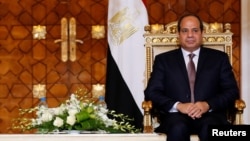Egyptian President Abdel Fattah el-Sissi will pick a chairman and members of a new media council under a law passed on Monday, giving the body the power to fine or suspend publications and broadcasters and give or revoke licenses for foreign media.
The law, approved by parliament and signed into law by Sissi, creates the so-called Supreme Council for the Administration of the Media whose chairman will be picked by Sissi and whose remaining members will be appointed by him based on nominations from various bodies including the judiciary and parliament.
Human rights organizations and the New York-based Committee to Protect Journalists have repeatedly criticized media freedoms in Egypt, which jailed the second most journalists of any country in the world in 2015, according to the CPJ.
The new council is tasked with suing media organizations that violate its regulations, creating a list of penalties, fining media organizations that break license terms, and can revoke or suspend the right to publish or broadcast.
It will also ensure fair competition between media groups as well as their independence and neutrality, adherence to journalistic ethics, and will make sure they do not compromise national security, the Official Gazette in which the law was published said.
Yehia Qalash, chief of the press syndicate, told Reuters that the law and the council were mostly concerned with administrative affairs and did not compromise media freedoms.
Parliament was still debating other media legislation, he said.
A second media law will cover sentencing, freedom of information, confidentiality of sourcing and the relationship between journalism and national security, lawmakers and press syndicate members said.
The press syndicate had lobbied for a single media law encompassing all issues but parliament decided on two separate laws.
On Sunday, the Interior Ministry said it had arrested an Al Jazeera news producer, accusing him of “provoking sedition” on behalf of the Qatar-based broadcaster that it considers a mouthpiece of the banned Muslim Brotherhood.
Three Al Jazeera journalists were arrested in December 2013 and sentenced to between seven and 10 years in prison on charges including spreading lies to help a terrorist organization. One was eventually deported and the two others freed in 2015.
Police raided the Egypt's press syndicate offices in Cairo in May and arrested two journalists critical of the government. Thousands of Egyptian journalists protested the move.
A court in November found the syndicate leadership, including Qalash, guilty of harboring criminals and sentenced them to two years in prison in relation to the incident. Qalash has appealed and is out of detention on bail.
The government says it respects media freedom and all jailed journalists are facing criminal charges unrelated to their work.





